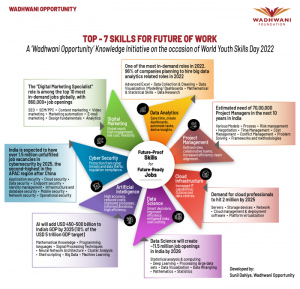
Skilling key to future-proofing global economy: World Youth Skills Day is celebrated on July 15 every year to highlight the need to impart the right skills to equip young people for employment and entrepreneurship. World Youth Skills Day 2022 comes at a time when the global economy is staring at a recession of a magnitude unseen since the Great Depression.
The world had hardly recovered from the impact of the Covid-19 pandemic when it was hit by the Russia-Ukraine war that further deepened the crisis by triggering supply chain disruptions and high inflation throughout the world. The global economy was already grappling with issues such as climate change, rising inequality and an ageing population when it was hit by the double whammy of the pandemic and the geographical conflict.

This is also the right time to spare a thought for minority groups, indigenous communities, rural population, the poorest sections of the society, people with disabilities, and young girls who fail to join the millions of jobseekers every year. There are also millions of young people getting displaced due to climate change, ethnic conflicts and war. According to various estimates, 30% of all young women and 13% of men are unemployed. At least 600 million jobs need to be created in the next 15 years to meet the demand for jobs.
READ I Can rupee on steroids challenge dollar-euro duopoly
Pandemic stalls skilling of youth
The Covid-19 pandemic saw businesses world over using disruptive technologies such as artificial intelligence, robotics, and internet of things (IoT) to tide over the challenges posed by lockdown measures. The technological disruption has made it difficult even to predict the kind of jobs required in the future, making the task of skilling the youth extremely difficult.
The pandemic crisis has changed the way work is done in organisations with remote working becoming the new normal. Expectations of the employees in terms of flexibility in work is forcing organisations to revamp their HR management strategies for hiring and retaining talent. On the other side of the spectrum, employees are not sure about the future nature of their work and the skills needed to survive and thrive in the future.
The pandemic crisis saw businesses ignoring skill development because of the strict lockdown measures taken by governments. The United Nations estimate that training of 86% of apprentices and 83% of interns/trainees was interrupted during the Covid-19 crisis. It says around 50% of the employers stopped paying stipend to apprentices and trainees.
There is a need to revive the skilling of youth, both by education institutions and by businesses. It is estimated that the number of young people will grow by 78 million by 2030 with poor nations accounting for half of the increase. The governments and businesses need to wake up to the situation and address this challenge.
